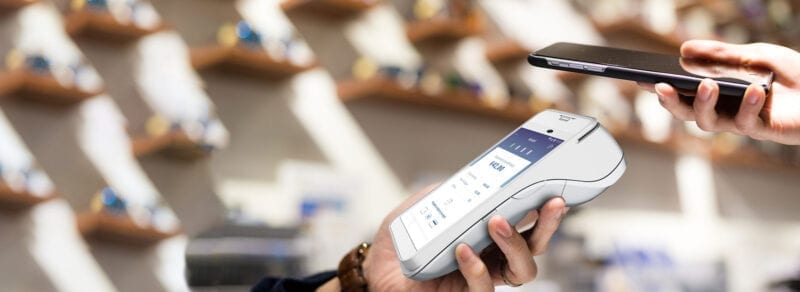Contactless Payments are here to Stay

Let’s face it – times are changing. Around the world, nearly half of consumers reported swapping out their usual chip or pin cards for a contactless option. Even before the pandemic, cards were becoming the preferred payment method in place of cash. Today and in the future, contactless payments will continue to be the frontrunner for those pulling out their wallets.
To be competitive, it’s crucial for software providers to provide a variety of ways to accept payments. We’ve highlighted current trends like contactless cards and mobile wallets, plus ones to watch out for in the future so you can stay ahead and on track with consumer trends.
Contactless payments
The phrase “contactless payments” means any in-person and online transactions that don’t involve the consumer physically touching a terminal. The benefit of providing acceptance for contactless cards is ultimately the seamless experience it provides.
There’s been a 150% jump in contactless payments since 2019, and 74% of consumers plan to continue contactless use going forward. As a result, it’s becoming the norm for consumers to “tap” their payment cards rather than use their chip or signature, or do their shopping online rather than in-store. In a world where time is money, contactless payments provide time-savings and convenience at the checkout.
Instead of a consumer pulling out their card, swiping it, or having to touch an unsanitized pin-pad, they can hover their card over the terminal screen. Voila – the transaction goes through in a couple of seconds, rather than upwards of 30 seconds. You may think this is a slight difference, but ensuring the checkout experience is as fast as possible increases your chance of purchase completion.
Online transactions show a similar story. The move to shopping online has increased tenfold since the pandemic began. From ordering food delivery rather than dining-in, to donating online to your favorite cause instead of venturing out in-person – going virtual is here to stay. More than $105 billion has been added to the e-commerce market in the US in 2020 alone. This is a significant cue that shoppers’ preferences are changing.
One way you can take advantage of this shift is by offering your customers a product set that makes e-commerce payments easy. Combine this with a variety of payment acceptance, like in-store tap and mobile wallets, and your customers are ready to accept any payment, any time.
Mobile wallets
We can see how convenient it is to tap a payment card – so how does that compare to mobile wallets? Mobile wallets encompass payment methods such as Apple Pay, Google Pay, and Samsung Pay. For mobile phone users that have set up their mobile wallet, all they have to do is hover their phone over the payment terminal and the transaction is completed within seconds. The less time it takes to make a purchase, the more likely it is to be completed. This again proves the same for online purchases.
Rather than having consumers fill in lengthy payment details, mobile wallets offer a checkout experience that takes up a fraction of the time of regular card payments. While mobile wallet adoption is still growing, it is growing fast. In 2021, more than 4 out of 10 smartphone users completed a mobile wallet payment, and there are numerous reasons why shoppers are turning to this payment method recently:
- Sanitary purposes – wanting to avoid paper currency and payment cards, which make contact with terminals or hands of strangers
- Ease-of-use – if you’re already holding your phone, no need to reach into a wallet or bag
- Preferring to leave your wallet at home – particularly in young shoppers, they opt to bring their phone to pay when running errands
- Organization – many mobile wallets store more than just credit card details, such as coupons, tickets, and membership cards.
By giving your clients the option to pay with mobile wallets, you are increasing your revenue potential and keeping up with how shoppers want to pay now.
The future
You may be asking yourself, “won’t we just switch back to cash and in-store payments when the world goes back to its pre-pandemic state?”. The answer is no. The entire world has shifted the way we live and do business, and this shift will continue as our new normal. So what does the future of contactless payments look like? Based on the trends we highlighted previously, we can forecast the increased preference for e-commerce over in-person payments, the need for sanitary and efficient transactions, and increased digital wallet use.
E-commerce set to takeover
E-commerce has been a steady trend for quite some time and shows no signs of slowing down. Every place from non-profits to restaurants to boutiques have shifted from physical storefronts to online shops. Offering both of these options to consumers is key to keeping up with the times now and in the future. Globally, e-commerce is predicted to produce $5.4 trillion in revenues in 2022 versus $4.9 trillion in 2021. Not only will e-commerce continue on an upward trend, but B2B e-commerce will soon outperform B2C e-commerce. Numbers talk, which is why software providers must have a secure and trusted online payments provider to carry them through these trends.
Switching cards for mobile phones
Digital wallets are currently at the beginning of their trend curve. Adoption is rising, but the real boom will be in the near future. The changing needs of the consumer revolve around convenience and speed, which digital wallets encompass. Asia-Pacific currently leads the digital wallet movement, with over 95% of digital Chinese consumers stating they used a digital wallet in 2020. In North America, approximately half of consumers use a digital wallet, but as barriers begin to collapse, this number will rise. Developments in technology allow for increased security and diminished friction points, which is one of the main reasons users are opting to switch processes. Not only are mobile wallets more convenient, but they are the sanitary choice for many consumers. Likewise, Gen-Z, tokenized as the “tech generation”, will further drive adoption as businesses target the desires of this up-and-coming consumer group.
Many trends come and go, but when efficiency, convenience, and security are combined, consumers won’t go back. Accepting contactless payments, enabling the switch to e-commerce, and accepting mobile wallets are processes that ensure your software will appeal to any size business. Reach out to our sales team to learn how our contactless offerings can future-proof your software.
Source: Bambora.com


